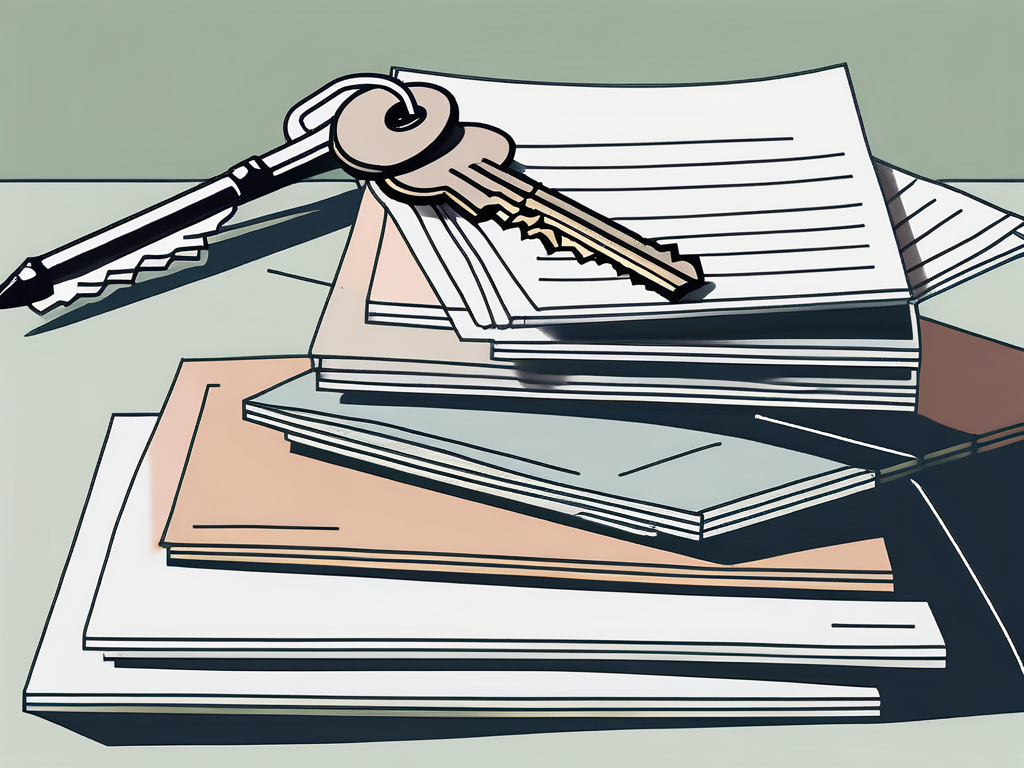Legal Forms You Need to Sell Your Home


Selling your home is a complex process that involves various legal aspects. One crucial aspect that you cannot afford to overlook is the proper documentation and legal forms. Having the right legal forms in place is essential for protecting your interests as a seller, ensuring transparency in the transaction, and avoiding potential legal pitfalls. In this article, we will explore the importance of legal forms in home selling, provide a comprehensive list of essential forms, discuss the legalities involved, highlight the consequences of not having the proper forms, and offer guidance on seeking legal help. So, let's dive in and get acquainted with the legal forms you need to sell your home!
Understanding the Importance of Legal Forms in Home Selling
When it comes to selling your home, the role of legal forms cannot be stressed enough. These forms serve as a means to document the terms and conditions of the sale, provide necessary disclosures, and protect all parties involved in the transaction.
The Role of Legal Forms in Property Transactions
Legal forms play a crucial role in property transactions, as they enable sellers to disclose important information about the property to potential buyers. For example, the Property Disclosure Form allows sellers to provide details about any known defects, past repairs, or other significant factors that may impact the value or desirability of the property. This form helps buyers make informed decisions and protects sellers from potential lawsuits resulting from non-disclosure.
Moreover, legal forms also ensure that buyers have a clear understanding of what they are purchasing. The Seller's Property Information Form, for instance, allows sellers to provide additional information about the property, such as the age of the roof, the condition of the plumbing system, or any recent renovations. This form helps buyers assess the overall condition of the property and make an informed decision.
Similarly, the Purchase Agreement Form is a legally binding contract that outlines the terms and conditions of the sale, including the purchase price, financing arrangements, contingencies, and the timeline for completing the transaction. This form protects both the buyer and the seller by ensuring that all parties have a clear understanding of their rights and obligations.
Why You Can't Ignore Legal Paperwork When Selling Your Home
Ignoring legal paperwork when selling your home can have severe consequences. Failing to provide necessary disclosures or using improper forms can lead to legal disputes, financial repercussions, or even the nullification of the sale. To avoid such problems, it is crucial to familiarize yourself with the specific legal requirements in your jurisdiction and ensure that all necessary forms are properly completed and signed.
Furthermore, legal forms also provide a layer of protection for sellers. By using the appropriate forms, sellers can ensure that they are not held responsible for any issues that arise after the sale. For example, the Release of Liability Form allows sellers to transfer the responsibility for any future repairs or damages to the buyer. This form protects sellers from potential lawsuits and ensures a smooth transition of ownership.
In conclusion, legal forms are an essential aspect of the home selling process. They provide a framework for transparency, protect all parties involved, and help prevent legal complications. By taking the time to understand and properly complete these forms, sellers can ensure a successful and legally sound transaction.
Comprehensive List of Legal Forms for Home Selling
Now that we understand the significance of legal forms in home selling, let's look at a comprehensive list of forms that you may encounter during the process:
- Property Disclosure Form: This form requires you to disclose any known defects, hazards, or other pertinent information about the property.
- Purchase Agreement Form: A legally binding contract that outlines the terms and conditions of the sale.
- Deed of the House: This form transfers ownership of the property from the seller to the buyer.
- Counteroffer Form: Used when negotiating changes to the purchase agreement.
Additionally, another crucial form in the home selling process is the Lead-Based Paint Disclosure Form. This form is required for houses built before 1978 and ensures that the buyer is informed about any potential risks associated with lead-based paint in the property. It is essential for compliance with federal regulations and to protect both the buyer and seller.
Furthermore, the Home Inspection Contingency Form is a vital document that allows the buyer to conduct a professional inspection of the property. This form outlines the terms under which the buyer can opt-out of the purchase agreement if significant issues are found during the inspection. It serves as a crucial step in ensuring transparency and fairness in the home selling process.
Navigating the Legalities of Home Selling
Legal Requirements for Home Sellers
Before putting your home on the market, it is essential to familiarize yourself with the legal requirements imposed on home sellers in your jurisdiction. These requirements may vary from state to state, but common obligations include providing accurate and complete disclosures, complying with fair housing laws, and adhering to any local regulations governing property sales.

Additionally, it is crucial for home sellers to understand the implications of signing legal documents such as the sales contract, deed, and any disclosures. These documents outline the terms of the sale and can have significant legal consequences if not handled correctly. Seeking guidance from a real estate attorney or agent can help ensure that you are fulfilling all legal requirements and protecting your interests throughout the selling process.
Common Legal Issues in Home Selling
Home selling can sometimes be accompanied by legal issues that require attention. For example, disputes related to property boundaries, encroachments, or easements can arise during the sale process. It is crucial to address these issues promptly and consult legal professionals if needed to avoid compromising the transaction or facing legal consequences down the line.
Furthermore, understanding the implications of title defects, liens, or unresolved disputes on your property is essential for a smooth sale process. These issues can delay or even derail a sale if not addressed proactively. Conducting a thorough title search and resolving any outstanding issues before listing your home can help prevent surprises during the closing process and provide peace of mind to both you and potential buyers.
The Consequences of Not Having the Proper Legal Forms
Legal Risks of Incomplete Paperwork
Not having the proper legal forms in place can expose sellers to legal risks and potential liabilities. Incomplete or incorrect paperwork may result in disputes over the terms of the sale, allegations of non-disclosure, or other legal complications that can lead to litigation and financial loss.
It is crucial for sellers to ensure that all necessary legal forms are properly filled out and executed to protect themselves from potential legal challenges. Failure to do so could leave them vulnerable to lawsuits, fines, or even the nullification of the sale agreement. By taking the time to accurately complete all required paperwork, sellers can safeguard their interests and prevent costly legal battles down the line.
Potential Financial Implications
When legal forms are not properly executed, there can be significant financial implications. For example, if the buyer discovers undisclosed defects or issues with the property after the sale, they may seek compensation from the seller. Additionally, improperly drafted purchase agreements or inadequate disclosures can lead to delays in closing or even the cancellation of the sale, which can result in lost time, money, and opportunities.
Moreover, the financial repercussions of incomplete legal paperwork extend beyond the immediate aftermath of the sale. Inaccurate or missing documentation can create long-term financial risks for sellers, such as legal fees, damages awarded to the buyer, or a tarnished reputation in the real estate market. By prioritizing the completion of all necessary legal forms with precision and attention to detail, sellers can safeguard their financial well-being and uphold their professional integrity.
Seeking Legal Help for Home Selling
When to Consult a Real Estate Attorney
Given the complex nature of home selling, it is wise to consult a qualified real estate attorney. An attorney can provide expert guidance, review legal documents, ensure compliance with local regulations, and safeguard your interests throughout the transaction. Consider seeking legal advice during the early stages of the selling process to address any potential legal issues proactively.

Real estate attorneys can also assist in resolving disputes that may arise during the selling process, such as issues with the title, property boundaries, or contract terms. Their expertise can be invaluable in protecting your rights and ensuring a smooth transaction from start to finish.
Benefits of Hiring a Real Estate Agent
In addition to a real estate attorney, hiring a licensed real estate agent can also be beneficial. Real estate agents have specialized knowledge and experience in navigating the intricacies of home selling. They can help ensure that all legal forms are properly completed and guide you through the entire process, including pricing, marketing, negotiating offers, and coordinating inspections and closing.
Furthermore, real estate agents have access to a wide network of potential buyers, increasing the visibility of your property and potentially leading to a quicker sale. Their expertise in marketing strategies and negotiating skills can help you secure the best possible deal for your home, maximizing your financial return.
Final Thoughts on Legal Forms for Home Selling
Ensuring a Smooth Home Selling Process
To ensure a smooth home selling process, it is essential to prioritize the proper completion of legal forms. Familiarize yourself with the specific forms required in your jurisdiction, seek legal assistance when necessary, and maintain transparency and integrity throughout the transaction. By doing so, you can protect your interests, mitigate legal risks, and enhance your overall selling experience.

The Peace of Mind in Legal Compliance
Complying with the legal requirements and having the proper legal forms in order not only protects you but also provides peace of mind. Knowing that you have fulfilled your obligations as a seller and have taken the necessary steps to ensure transparency and legality in the transaction can help you navigate the selling process confidently and successfully.
Remember, legal forms are a vital component of selling your home. Do not underestimate their importance and consult professionals to ensure that your paperwork is accurate, complete, and legally sound. Selling a home is a significant financial and legal endeavor, and by being diligent in your preparation, you can maximize your chances of a smooth and successful sale.
Professional Guidance for Legal Clarity
When it comes to navigating the intricate landscape of legal forms for home selling, seeking professional guidance can be invaluable. Real estate attorneys or experienced real estate agents can provide crucial insights into the specific forms required in your area, ensuring that you are fully compliant with local regulations and laws.
Additionally, these professionals can offer clarity on complex legal terminology, potential pitfalls to avoid, and best practices for completing and submitting the necessary paperwork. Their expertise can give you the confidence to proceed with the home selling process knowing that you have expert guidance every step of the way.
Understanding the Nuances of Legal Forms
Each legal form involved in the home selling process serves a distinct purpose and requires careful attention to detail. From disclosure forms to purchase agreements, understanding the nuances of each document is essential to safeguarding your interests and ensuring a seamless transaction.
Take the time to familiarize yourself with the contents of each form, seeking clarification on any terms or clauses that may seem confusing. By gaining a comprehensive understanding of the legal forms involved, you can approach the home selling process with confidence and clarity, knowing that you have taken the necessary steps to protect yourself legally.
Take Control of Your Home Selling Journey with SmartSellersMatch.com
Ready to navigate the home selling process with confidence and expertise? SmartSellersMatch.com is here to guide you every step of the way. Our comprehensive FSBO course, available for free, is designed to equip you with the knowledge and tools necessary to sell your home successfully online. From a consolidated library of essential legal documents to our innovative FSBO Assistant chatbot, we provide personalized support to help you create compelling listings, estimate your home's value, and understand the costs involved. Don't leave your home sale to chance—take the free FSBO Course today and match your smart selling decisions with success.





